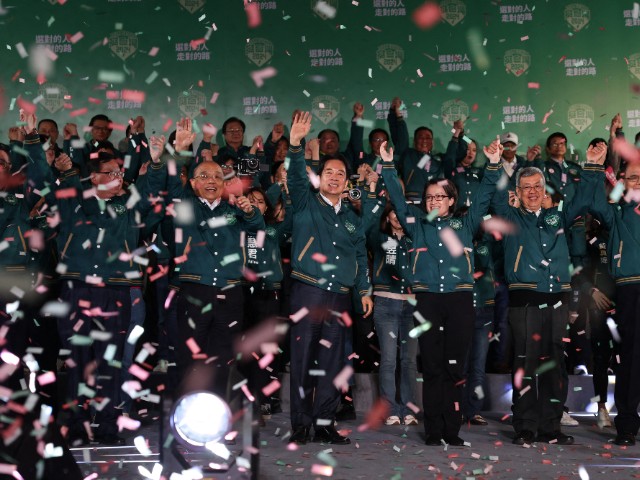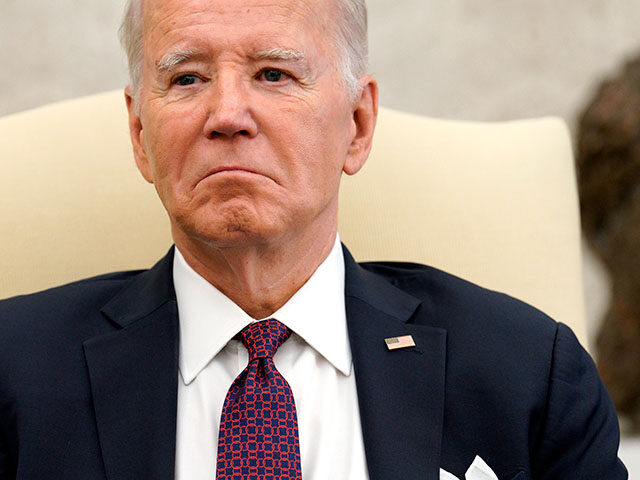President Joe Biden offered no words of congratulations or support to Taiwanese President-elect Lai Ching-te following his election victory on Saturday, telling reporters simply that America does “not support independence.”
Lai, of the anti-communist Democratic Progressive Party (DPP), defeated two leftist rivals on Saturday to hand his party an unprecedented third term in power. Lai is currently the vice president of the country and will succeed current DPP President Tsai Ing-wen.

Taiwan’s President-elect Lai Ching-te (center L) and his running mate Hsiao Bi-khim (center R) attend a rally outside the headquarters of the Democratic Progressive Party (DPP) in Taipei on January 13, 2024, after winning the presidential election (ALASTAIR PIKE/AFP).
Taiwan is a sovereign nation with its own government and civil institutions wholly independent of the Chinese Communist Party. Despite this reality, Beijing insists that Taiwan is a province of China and its government is a rogue “separatist” organization. The Chinese government forces countries to choose between recognition of Taiwan’s sovereignty or diplomatic ties with China, so most of the world’s nations do not maintain formal ties with Taiwan. At press time, only 12 countries in the world recognize Taiwanese sovereignty, following Nauru’s abandonment of Taipei this weekend in the aftermath of Lai’s election. America is not one of the 12; former President Jimmy Carter abandoned Taiwan to forge ties with the Communist Party in 1979.
America, nonetheless, maintains unofficial ties, including weapons sales deals, with the Taiwanese government. Secretary of State Antony Blinken congratulated Lai on his victory on Saturday and an unofficial American delegation met with Lai in Taiwan on Monday:
Pleased to meet @BoardChairAIT Laura, Director Oudkirk, former Deputy Secretary of State Steinberg & former National Security Advisor Hadley today. Together with our friends in the US, Taiwan remains steadfast in promoting democracy, peace & prosperity in the Indo-Pacific. pic.twitter.com/yVRCbsWegi
— 賴清德Lai Ching-te (@ChingteLai) January 15, 2024
Biden, however, kept his distance. Asked if he had a “reaction” to the presidential election this weekend, Biden’s only documented remark was, “We do not support independence.”
In contrast, Blinken applauded Taiwan on Saturday for “once again demonstrating the strength of their robust democratic system and electoral process” and congratulated Lai personally.
“The partnership between the American people and the people on Taiwan, rooted in democratic values, continues to broaden and deepen across economic, cultural, and people-to-people ties,” Blinken added in his statement. “We look forward to working with Dr. Lai and Taiwan’s leaders of all parties to advance our shared interests and values, and to further our longstanding unofficial relationship.”
Blinken added that work with Taiwanese government officials would remain “consistent” with America’s commitments to communist China.
The President of Taiwan CALLED ME today to wish me congratulations on winning the Presidency. Thank you!
— Donald J. Trump (@realDonaldTrump) December 3, 2016
Biden’s frigid comment on the Taiwanese election did little to prevent the Chinese Communist Party from publishing an infuriated statement directed at Blinken.
“The US State Department’s statement on the election in China’s Taiwan region seriously violates the one-China principle. … We strongly deplore and firmly oppose this, and have made serious representations to the US side,” the Foreign Ministry fumed.
“China firmly opposes the US having any form of official interaction with Taiwan and interfering in Taiwan affairs in any way or under any pretext,” the statement continued, “We urge the US to earnestly abide by the one-China principle. … We urge the US to stop interactions of an official nature with Taiwan.”
The “one-China principle” is communist China’s false insistence that Taiwan is a province of China. The United States follows a different affirmation, the “one-China policy,” which states that there is only one China in the world but does not clarify if it recognizes the People’s Republic of China or the Republic of China, the formal name for the federal government of Taiwan.
FLASHBACK: Biden’s Secretary of State Blinken Says, “We Do Not Support Taiwan Independence” While Visiting China
Lai won the presidency despite China’s escalating threats to invade and “crush” the Taiwanese government prior to the election – declarations suspected to boost votes for the opposition, China-friendly Kuomintang (KMT) and Taiwan People’s Party (TPP) parties.
“The Chinese People’s Liberation Army remains on high alert at all times and will take all necessary measures to resolutely crush any form of ‘Taiwan independence’ separatist plots and firmly defend national sovereignty and territorial integrity,” Chinese Defense Ministry spokesman Zhang Xiaogang declared on Friday.
Lai appeared to recognize the threats in his acceptance speech, described by Taiwanese media as an “olive branch” to Beijing.
“The Taiwanese people have successfully resisted efforts from external forces to influence this election,” Lai said, according to a translation in the Hindustan Times. “We don’t want to become enemies with China. We can become friends. We are determined to safeguard Taiwan from continuing threats and intimidation from China.”

COMMENTS
Please let us know if you're having issues with commenting.